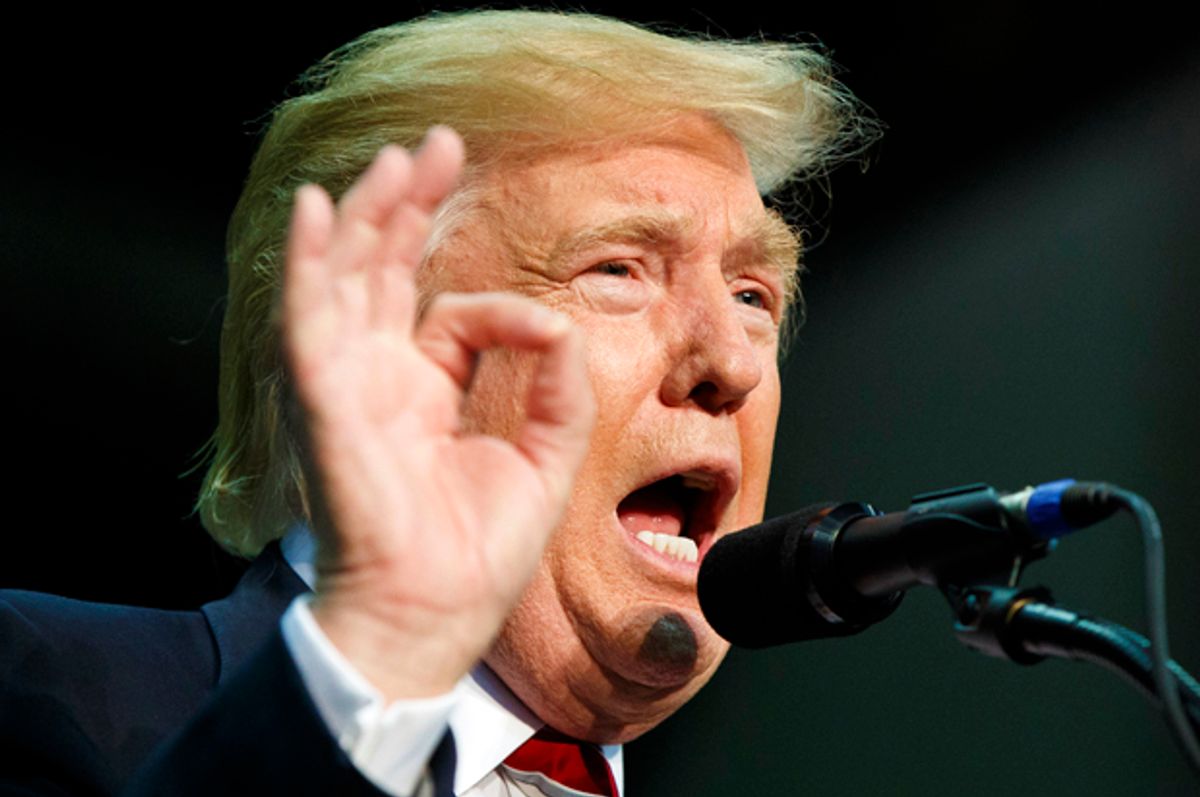What Hillary Clinton said may have been politically unwise but was also obviously true: Many Donald Trump supporters are motivated by racism.
“Just to be grossly generalistic, you could put half of Trump’s supporters into what I call the basket of deplorables,” said Clinton at a New York fundraiser on Friday night, where access was purchased at a price of $1,200 to $250,000. “They’re racist, sexist, homophobic, xenophobic, Islamaphobic — you name it," she said.
"But the other basket . . . of people are people who feel that the government has let them down, the economy has let them down, nobody cares about them, nobody worries about what happens to their lives and their futures, and they’re just desperate for change," Clinton added. "Those are people we have to understand and empathize with as well.”
Trump, feigning outrage, has gleefully seized on Clinton’s comments, and most observers believe they were impolitic. This is all, however, missing an important point: Clinton was wrong to divide Trump voters between the bigoted and economically anxious because many are both, and the two things are interrelated. For many, it’s just one big basket. Clinton, in drawing a distinction between the racists and the justly upset, echoes a broader and mostly unhelpful debate about whether Trump supporters are motivated by economic anxiety or bigotry: The clear answer, contrary to Matthew Yglesias and company, is “often both.”
Yes, Trump is getting a lot of support from professional racists on the white supremacist and alt-right, and reducing his base of support to any single constituency is a fool’s errand. But for many Trump voters, anger and anxiety over economic decline and precarity, the rising status of women and people of color, demographic change caused by immigration, and the country’s waning global power after more than a decade of costly and futile global warfare, are all wrapped into one big sense of foreboding terror. Trump promises relief and a reversion to something that was, in senses both real and imagined, better.
There is a lot that’s new about Trump. But the intersection of exploitative economics and white supremacy certainly isn’t: White economic anxiety is used to foment racism, and racism is manipulated to further elite economic interests.
As Michelle Alexander has written, America’s racial caste system has long been perpetuated by “appealing to the racism and vulnerability of lower-class whites, a group of people who are understandably eager to ensure that they never find themselves trapped at the bottom of the American totem pole.”
The Southern slave-owning aristocracy and the Jim Crow governments that took power after Reconstruction’s defeat peddled white supremacy to protect a political-economic order that not only terrorized blacks but that also kept poor whites on the margins. As historian Ira Katznelson detailed in “Fear Itself: The New Deal and the Origins of Our Time,” Southern Democrats during the New Deal era used their hold on Congress to leverage this divide and conquer logic on the national scene. They blocked civil rights measures and also obstructed the growth of a labor movement poised to improve the condition of workers across the racial divide and in doing so threaten Jim Crow.
Later, the modern conservative movement once again used racism toward economically reactionary ends, employing “racial dog whistles to transmute white anxiety into support for conservative economic policies that have harmed us all,” as Ian Haney-López and Heather McGhee wrote for The Nation.
“Beginning in the 1970s, conservatives deployed a highly racialized strategy that relentlessly linked public institutions to undeserving minorities in order to undo the country’s social contract,” Haney-López and McGhee continued. “The reactionary economic agenda made possible by dog-whistle politics is responsible not just for the devaluing of black lives but for the declining fortunes of the majority of white families.”
Talking about poor and working class people like they are research specimens and not human beings to very wealthy people at an exclusive fundraiser tends to not be a good look, as Barack Obama and Mitt Romney both discovered. But it’s not just bad optics. It's crummy politics. The business-friendly agenda historically embraced by the Clintons fails to answer working-class white people’s economic concerns and in doing so actually fuels the fires of racism.
Opposing racism as some transcendent and ahistorical force obscures the fact that racism functions to not only keep people of color down but also to keep the 1 percent in charge. America’s racial caste system depends on white supremacy to ensure white privileges and oligarchic prerogatives. And so Clinton is right: We should understand and empathize with many Trump voters — not because establishment liberalism has much to offer them but because their problems are bound up with those of the people whom they hate.



Shares